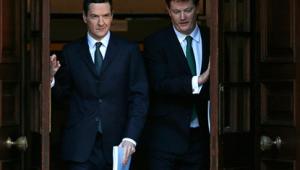In today’s PBR, the Chancellor will likely announce further upward revisions to the record borrowing projections for this year. The Government’s fiscal rules were already looking thread-bare at the time of Budget 2008. Now that we face the biggest peace-time hole in the public finances in the UK’s history, they are nothing more than a monument to a valiant but flawed attempt to control the spending urges of politicians. The Government’s fiscal stance in the boom years left the UK badly prepared to face recession and now risks the creditworthiness of UK Plc.
So if the old rules failed, what can be done to prevent governments from running unsustainable budget deficits? Those who argue that bond vigilantes and voters can police prudent and sustainable public finances misunderstand the problem. But nor will the Conservatives’ proposals for an Office for Budgetary Responsibility, by monitoring the fiscal position against the government’s pre-announced plans, prevent a recurrence of the recent failure. Osborne’s proposal is a step in the right direction, but politicians must retain the flexibility to ignore their past fiscal plans when rapidly changing circumstances necessitate a shift in policy, such as happened in the current recession. For this reason, the body would be vulnerable to being out-flanked by ministers who cloak their spending decisions in spurious arguments about the national interest. There is a more effective alternative institutional solution.
In 2006 the government took away from government departments the responsibility for the producing of key statistical information and gave it to the independent ONS. This radical change removed the temptation and opportunity for departments and ministers to manipulate statistics to make their policies look better. But one thing that wasn’t handed to the independent bods at ONS was the forecasting of tax revenue and expenditure. This job remains with the Treasury and HMRC.
As a report by the SMF, released on Monday, argues, it’s time the fiscal projections were out-sourced to a statutorily independent Office for Fiscal Analysis, protected by the national statistics code. This would remove the opportunity for any political input into the most important statistical data used in the UK government. Under this system, unsustainable government spending would be exposed as such, and ministers would no longer be able to massage the figures with such devastating consequences for the UK’s prosperity.
Ian Mulheirn is director of the Social Market Foundation











